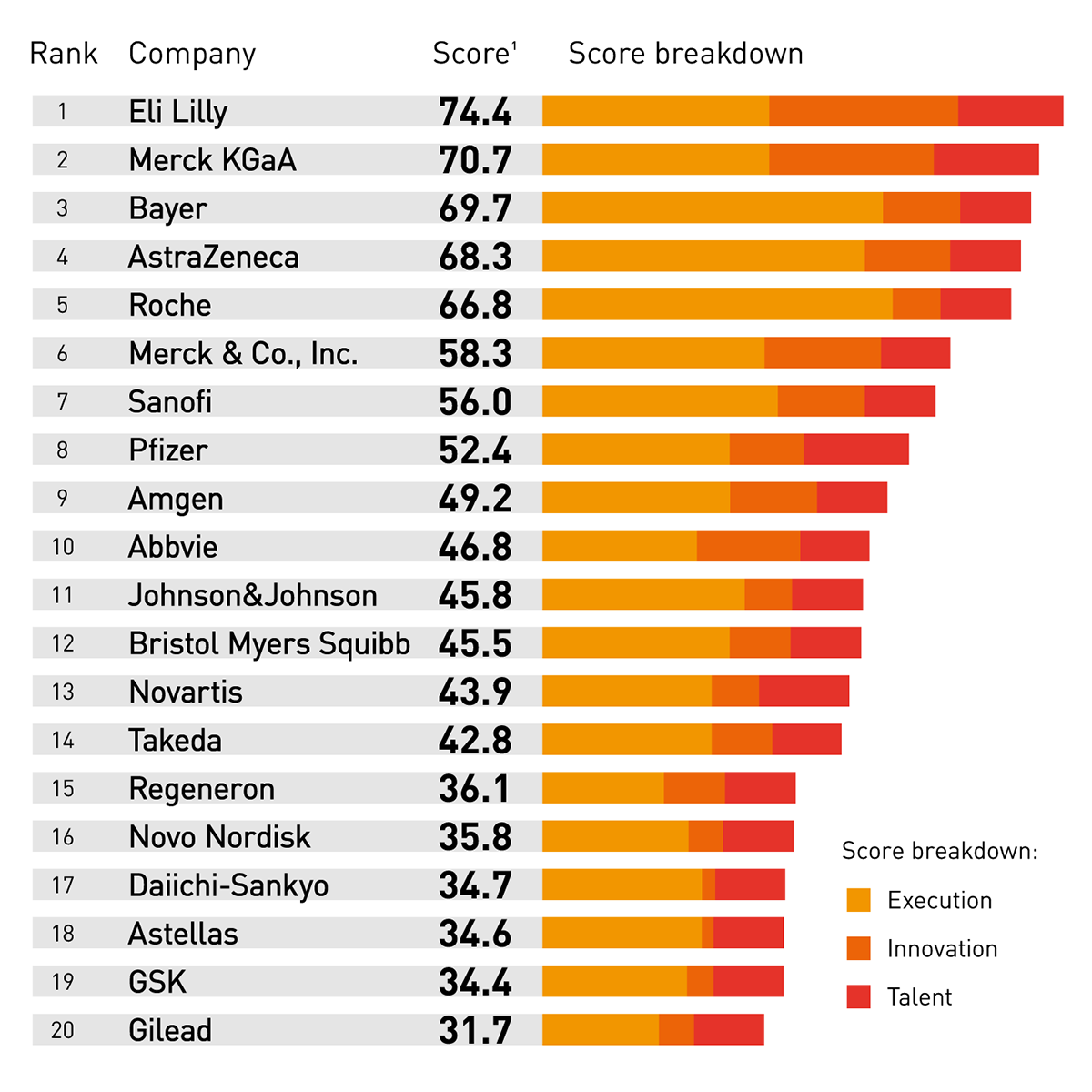
Pharma’s AI Readiness Index: Who Leads the Race?
Artificial intelligence is becoming a strategic imperative in the pharmaceutical industry, rather than just an experimental add-on.
The latest AI Readiness Index by CB Insights shows which global giants are best positioned to turn algorithms into competitive advantage.
The ranking underscores a turning point: leadership is no longer about “getting ready” for AI but about executing at scale, with drug discovery, clinical development, and manufacturing as the primary battlefields.
The Top Contenders in 2025
According to CB Insights’ latest analysis, Eli Lilly tops the list, followed closely by Merck KGaA, Bayer, AstraZeneca, and Roche. The narrow gap between second and fifth place (just 3.9 points) shows how intensely competitive the AI race has become.
Figure 1. Pharma AI readiness index – The top 20 companies

¹ Score is out of 100.
Source: “Pharma AI readiness: How the 50 largest companies by market cap stack up,” CB Insights, July 2025
1. Eli Lilly – From capital windfall to AI leadership
Eli Lilly’s booming revenues from its GLP-1 drugs — a class of treatments for diabetes and obesity — have given the company fresh resources to expand into AI. According to CB Insights, Eli Lilly has made 13 AI-related investments between August 2023 and May 2025 — more than any other pharmaceutical peer. Key moves include:
- Drug discovery: partnership with Insilico Medicine to accelerate target identification through generative chemistry.
- Regulatory automation: collaboration with Yseop for AI-driven clinical report generation.
- Medical devices: investment in RetiSpec for early Alzheimer’s detection.
With new AI-integrated research facilities in Indiana and Ireland ($7.3B), Lilly is blending infrastructure with algorithmic discovery at unmatched scale.
2. Merck KGaA – Digital governance as key to success
Despite a smaller market cap, Merck KGaA ranks second, driven by 10 AI investments during the analyzed period and a robust digital governance strategy.
- Its AI materials center in Japan ($70M) integrates AI into next-gen material sciences and bioprocessing.
- In R&D, the company partners with startups to apply AI in immuno-oncology and protein engineering.
- Merck’s data stewardship programs in Darmstadt have been cited as benchmarks in pharma for enterprise-wide data governance and architecture.

3. Bayer – Partnership powerhouse
Bayer excels in external collaboration, recording 21 AI partnerships, second only to Roche. When it comes to AI investments, Bayer ranks just behind the podium — holding fourth place among leaders with six deals during the analyzed period.
- The company’s AI platform for digital pathology (in partnership with Aignostics) enables faster biomarker discovery.
- Bayer’s Crop Science unit also feeds advanced data capabilities back into pharma, strengthening its AI architecture.
- Its €1.5B EU facilities are designed with AI-driven production and predictive maintenance systems.
4. AstraZeneca – Scaling AI globally
AstraZeneca is making AI central to its R&D operations.
- It invested $2.5B in an AI-powered R&D center in China, focusing on precision oncology and respiratory diseases.
- Through partnerships with BenevolentAI and Insilico, it applies machine learning to both small-molecule and biologics discovery.
- Its US and EU facilities integrate AI into clinical manufacturing, enabling faster scale-up of biologics.
5. Roche – Collaboration as a core strategy
Roche leads all peers in AI partnerships (22 in total during the analyzed period).
- The company’s Genentech unit works with Recursion and nVIDIA to power large-scale biological image analysis.
- Roche Diagnostics collaborates with PathAI to expand AI in pathology.
- It has pledged $50B over five years into AI-integrated R&D facilities in the US, positioning itself as a long-term ecosystem orchestrator.
The Next Five: Diverse AI Pathways
Beyond the top five, the remaining leaders also make significant bets:
- Merck & Co., Inc. – Building an AI-enabled vaccine manufacturing facility in North Carolina and deploying enterprise-wide LLMs.
- Sanofi – Developing CodonBERT, an AI platform for mRNA design, while committing $20B in US operations integrating AI and IoT.
- Pfizer – Deploying Vox, its Amazon-powered internal LLM, to streamline R&D data queries.
- Amgen – Partnering with Microsoft and nVIDIA on AI-accelerated supercomputing for protein modeling.
- AbbVie – Advancing ARCH, its AI-based target discovery platform, while investing $10B in AI-ready manufacturing facilities.

Preparing the Data Foundations for AI
AI readiness in pharma ultimately rests on the foundation of high-quality, well-governed data. Advanced algorithms and generative models are only as effective as the datasets they are trained on — a fact that becomes critical when AI is entrusted with research, clinical decision support, and operational optimization.
Beyond sheer volume, data must be accurate, consistent, and structured in ways that allow secure integration across clinical trials, manufacturing, and real-world evidence. This makes data quality the single most important determinant of successful AI deployment in the pharmaceutical sector.
Pharma companies therefore face three interrelated challenges:
- Data governance at scale – Establishing enterprise-wide standards for data lineage, provenance, and compliance (e.g., Merck KGaA’s global data stewardship model).
- Data integration and interoperability – Unifying siloed clinical, genomic, imaging, and real-world data into AI-ready architectures. Roche and Bayer are both building cloud-native data lakes to address this.
- Data literacy and culture – Training thousands of scientists to interpret and apply AI outputs responsibly; AstraZeneca has rolled out global AI literacy programs across its R&D workforce.
A rising theme is cross-industry data sharing, particularly in oncology. Consortia like Project Data Sphere or Roche’s collaborations in cancer genomics show that the most promising AI applications will require shared, harmonized datasets. Yet data sharing remains bound by privacy regulations, IP protections, and competitive dynamics — a balancing act that defines the next frontier of AI collaboration in pharma.
Conclusion
The Pharma AI Readiness Index 2025 makes it clear:
- AI is the new currency of competitiveness in pharma.
- Leading companies are those that combine capital, governance, partner networks, and data-driven strategies.
- Data maturity will be decisive: those who optimally control, integrate, and share data will shape the medical breakthroughs of tomorrow.
You might also like:
- Artificial Intelligence in Pharma and Healthcare » Learn more
- Data governance – the linchpin of efficient data management » Learn more
- Data sharing — Challenges and Opportunities » Learn more
- Cloud Data Warehouse – Next-Generation Data Management (e-book) » Learn more

